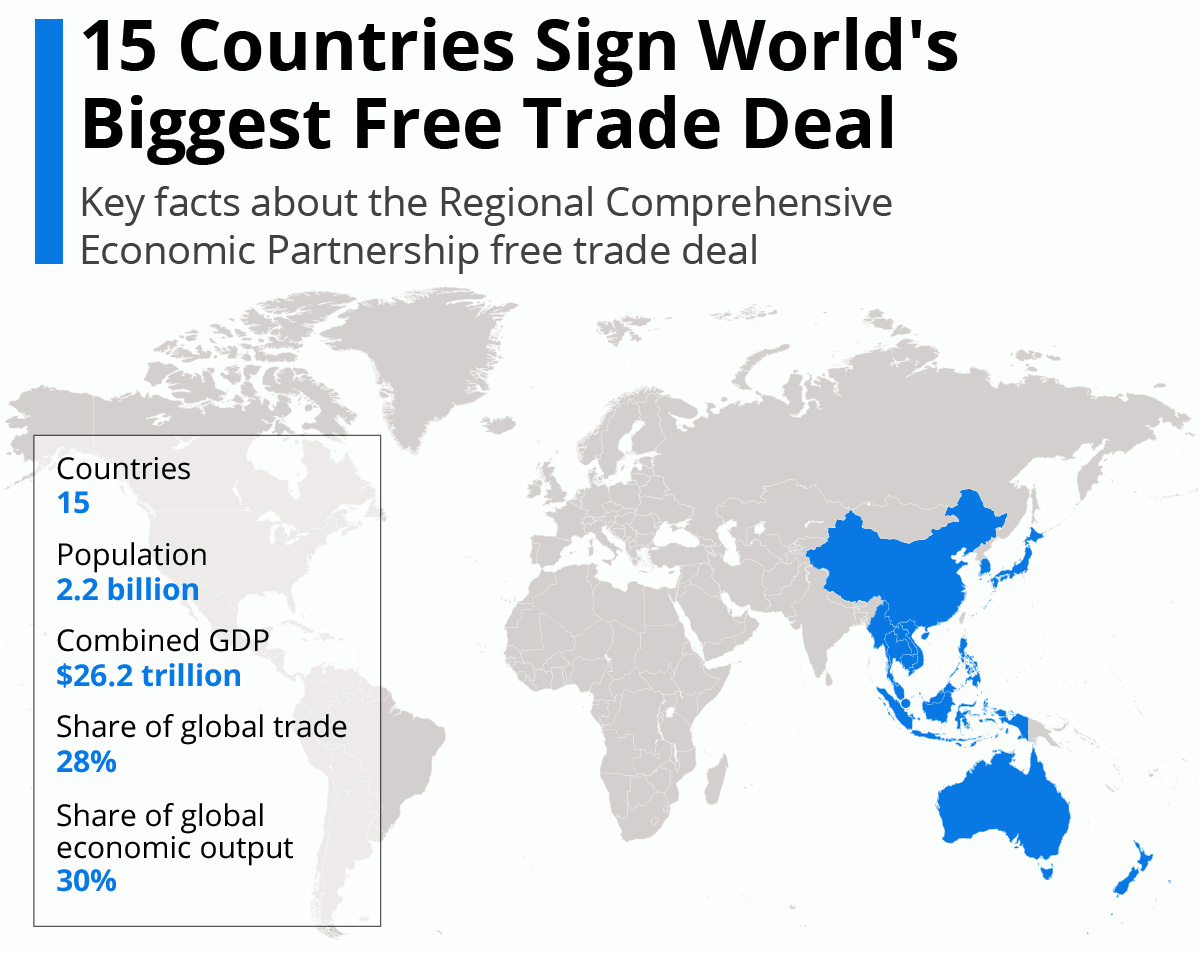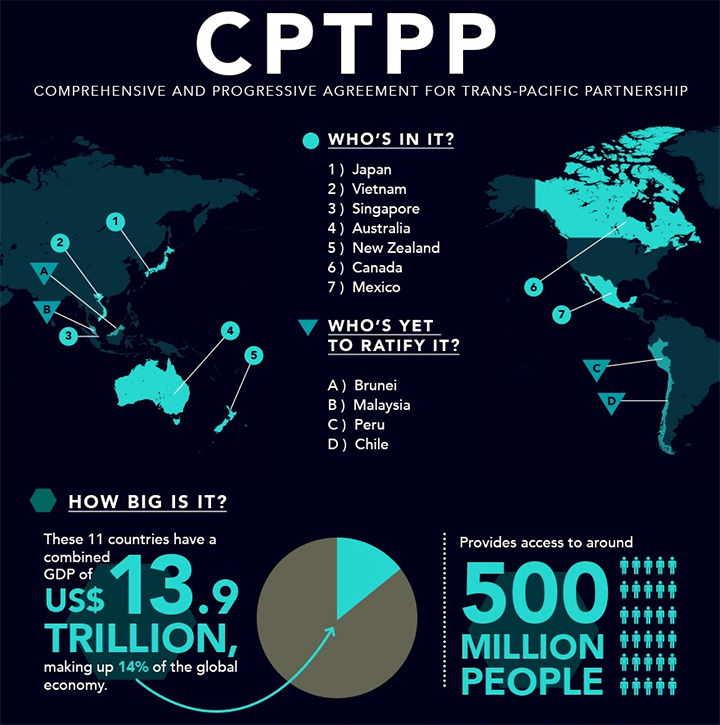International Relations
Reassessment of Regional Trading Agreements for India
- 16 Apr 2021
- 7 min read
Why in News
Recently, Singapore’s Foreign Minister while addressing the 6th edition of the Raisina Dialogue suggested India to reassess its stand on Regional Trading Agreements (RTA) such as Regional Comprehensive Economic Partnership (RCEP) and Comprehensive and Progressive Agreement for Trans-Pacific Partnership (CPTPP).
- The Raisina Dialogue is India’s premier conference on geopolitics and geoeconomics. The conference is hosted by the Observer Research Foundation in partnership with the Ministry of External Affairs, Government of India.
Key Points
- Regional Comprehensive Economic Partnership:
- About:

- RCEP is the world's largest Free Trade Agreement (FTA) and was signed by all 10 Association of Southeast Asian Nations is a regional organization (ASEAN) members and key partners including China, South Korea, Japan, Australia and New Zealand at the 4th RCEP leaders’ summit in November 2020.
- It could be some time before any country sees the benefits, because six ASEAN nations and three other nations have to ratify it before it takes effect.
- Ratification will likely be tricky in national parliaments, owing to both anti-trade and anti-China sentiments among the countries.
- Recently, Singapore became the first RCEP participating country (RPC) to complete the official ratification process and deposit its ratification instrument.
- Significance:
- Eliminate Tariffs:
- It is expected to eliminate a range of tariffs on imports within 20 years and also includes provisions on intellectual property, telecommunications, financial services, e-commerce and professional services.
- Equality:
- Under RCEP, parts from any member nation would be treated equally, which might give companies in RCEP countries an incentive to look within the trade region for suppliers.
- Businesses with global supply chains might face tariffs even within an FTA because their products contain components that are made elsewhere.
- Under RCEP, parts from any member nation would be treated equally, which might give companies in RCEP countries an incentive to look within the trade region for suppliers.
- Increased Global Income:
- The deal could increase global national income by USD 186 billion annually by 2030 and add 0.2% to the economy of its member states.
- However, some analysts think the deal is likely to benefit China, Japan and South Korea more than other member states.
- Eliminate Tariffs:
- India’s Stand:
- India withdrew from the RCEP largely because of concerns it would open it up to Chinese goods amid an already wide trade imbalance with China, and the failure of the agreement to adequately open up to services.
- About:
- Comprehensive and Progressive Agreement for Trans-Pacific Partnership:

- About:
- The CPTPP is a Free Trade Agreement (FTA) between 11 countries around the Pacific Rim which are :
- Canada, Mexico, Peru, Chile, New Zealand, Australia, Brunei, Singapore, Malaysia, Vietnam and Japan.
- After the US withdrew from negotiations of Trans-Pacific Partnership (TPP), the remaining 11 participants scrambled to amend the text of the agreement, and the newly renamed CPTPP was signed in March 2018.
- It came into force in December 2018.
- The CPTPP is a Free Trade Agreement (FTA) between 11 countries around the Pacific Rim which are :
- Significance:
- Removes Tariffs:
- The CPTPP removes 99% of tariffs on goods and services, just like the original TPP did.
- Broad Coverage:
- The CPTPP covers a broad range of goods and services. These include financial services, telecommunications, and food safety standards.
- Reduces Environmental Abuses:
- All countries agreed to cut down on wildlife trafficking. That helps elephants, rhinoceroses, and marine species the most.
- It prevents environmental abuses, such as unsustainable logging and fishing. Countries that don't comply will face trade penalties.
- Removes Tariffs:
- India’s Stand:
- India did not join CPTPP as it seeks to place greater labor and environmental standards on its other partners and CPTPP draft includes narrowly detailed qualifications on standards for investment protection, provisions to protect the host state’s right to regulate, and the imposition of detailed transparency requirements.
- About:
- Need for India to Reassess RCEP & CPTPP:
- To Boost its Manufacturing Sector:
- The RCEP & CPTPP blocs represent a major portion of the world economy, which may present India the possibility of being a manufacturing hub and export platform for the Pacific region with access to duty-free, quota free trade.
- To Strengthen Individual Relations:
- India already has steady trade relations or is negotiating new agreements with various RCEP & CPTPP countries such as Canada, Mexico, and Chile.
- To be a Major Player in Regional Development:
- India has a crucial role to play in helping the region build an inclusive architecture at a time of increasing global instability.
- Besides, rising US-China tensions are “deeply worrying” for the region with the pandemic resulting in “heightened tension”.
- To Provide Indian Companies Better Platforms:
- Such trade pacts will also give Indian companies a platform to showcase their strengths across even larger markets.
- To Boost its Manufacturing Sector:
Way Forward
Acknowledging India’s economic heft and value as a market, the RCEP & CPTPP members have left the door open for India. Given the global economic scenario in present times and the near future, it would be in India’s interest to dispassionately review its position on RCEP & CPTPP and carry out structural reforms that will help India to mitigate some of the repercussions arising from the RCEP & CPTPP.






